Theory of the ”clash of civilizations” is known to have been introduced by the American scientist of the Harvard University Samuel Huntington, and first published in an article titled ”Clash of Civilizations?” in the renowned American magazine ”Foreign Affairs” in the summer of 1993. Eventually, it was released as a book. (”The Clash of Civilizations and the Remaking of World Order” (New York: Simon and Schuster, 1996).
According to Huntington, the face of the modern world is defined by the existence of the number of civilizations: Western, Confucian, Japanese, Islamic, Indian, Slavic-Orthodox, Latin American and possibly African. In the upcoming XXI century clash of the civilizations would become the dominant factor of the world politics.
This theory immediately evoked genuine interest, both with a broader circle of public and the theorist-scholars and practicing politicians. Moreover, from the very outset, a polarization occurred in the assessment of this theory. While some argue that Huntington’s concept corresponds to modern realities, others try to prove that it is not viable.
Theses by S. Huntington forecast a ”clash of civilizations” that are differentiated from one another by the historical past, cultural-value traditions and particularly, denominational affiliation. American scientist believes that with the advent of the new, post-Cold War era, when a military-political standoff between the democratic West and communist East was relegated to the dustbin of history, the main source of conflicts and confrontations will be not the ideological and political differences, but religious and cultural ones. Furthermore, ”the most important conflicts of the future will occur along the cultural fault lines separating these civilizations from one another”.
Although, nation states would continue to remain the leading players in the international relations, conflicts largely will happen between the states, nations and societies, representing different civilizations and denominations. Moreover, according to the American scholar, in the mid-term perspective, the key struggle would unfold between the West and the countries belonging to the ”Islamic” and ”Confucian” civilizations. But the most likely would be clash between ”Western” and ”Islamic” civilizations.
According to Huntington’s view, existence of a ”certain enemy” is critically important for consolidation of ”emasculated and passive” Western society. In one of his recent works titled ”Who Are We?” (The Challenges to America’s National Identity (New York: Simon and Schuster, 2004) he emphasizes that without an image of a certain ”adversary”, the unity of the Western society can come to an end. Neoatlantist Huntington recommends the U.S. and its allies to wage wars with totalitarian “Islamic fundamentalism” overseas to prevent the loss of unity and national identity.
In the meantime, Huntington’s critics believe that, in the environment of intensification of modern globalization processes, intertwinement and interaction of different national-cultural values, human civilization must find ways of universal unification, regardless of religious and ethnic differences. Although a journey that lies ahead is long and thorny.
Parvin DARABADI
Doctor of historical sciences, Professor

























































